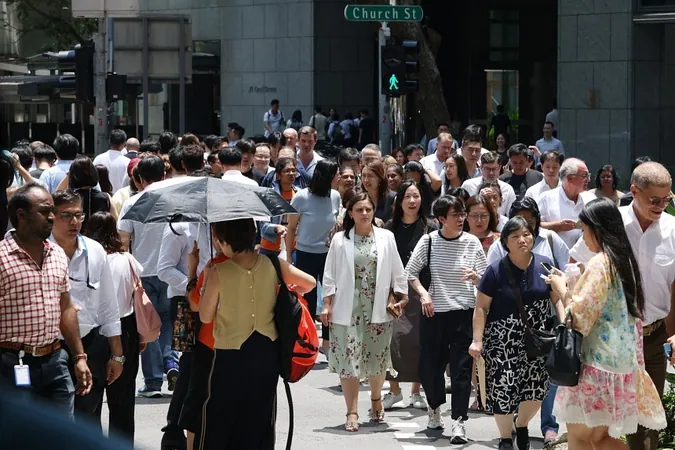
National Wages Council Urges Significant Pay Increases for Lower-Wage Workers in Singapore
2024-10-10
Author: Siti
NWC Recommendations for Pay Increases
SINGAPORE – In a groundbreaking announcement, the National Wages Council (NWC) has recommended that employers of lower-wage workers—those earning up to $2,500 a month—implement pay hikes ranging from 5.5% to 7.5%. This pay adjustment is aimed at providing necessary relief and recognition for employees whose contributions are pivotal, especially as economic conditions show signs of improvement.
Encouragement for Employers
The NWC has urged employers who reported strong performance to offer raises of at least $100 to $120, even exceeding the recommended percentage range. For those businesses facing challenges, a minimum wage increase at the lower end of the suggested range is encouraged, with the prospect of further increments should the business environment improve.
Implementation Timeline
These guidelines, which will take effect from December 1, 2024, to November 30, 2025, apply across all sectors, including both unionised and non-unionised firms. Notably, they align with a backdrop of easing inflation—core inflation is expected to drop to 3.1% year-on-year for the first half of 2024, down from 4.2% in 2023. This presents a favorable climate for wage discussions.
Importance of Equitable Wage Growth
NWC Chair Peter Seah emphasized the importance of equitable wage growth, stating that employers should share gains from productivity improvements to ensure sustainable wage increases. The guidelines signal an optimistic yet cautious outlook amid ongoing geopolitical tensions and tighter financial conditions worldwide.
Closing the Income Gap
Significantly, the NWC has emphasized the need to close the income gap by advocating for larger increases for the lowest-paid workers. This is part of a broader initiative to enhance the overall standard of living for lower-wage employees. The council has also reinstated its call for a flexible wage system that allows businesses to adjust wages based on performance, providing a cushion during downturns and incentivizing talent retention during economic upswings.
Focus on Sustainable Wage Growth
While previous guidelines suggested one-off payments to help employees manage rising living costs, this year's recommendations focus more on long-term sustainable wage increases. This reflects a more positive economic outlook. Nonetheless, the NWC underscored the need for businesses, particularly those facing economic hurdles, to improve productivity and invest in employee upskilling.
Alignment with Progressive Wage Model
Interestingly, the recommendations align with the Progressive Wage Model, a framework designed to ensure wage improvements parallel productivity and skill enhancements. This model is crucial for guiding wage negotiations in the upcoming year.
Trends in Wage Implementation
Recent statistics highlight that 62.3% of companies performing well have implemented both wage hikes and variable annual components. Meanwhile, over 73% of firms experiencing uncertain business conditions still provided variable compensation. This data suggests an emerging trend where companies actively seek to balance financial prudence with the need to reward their workforce.
Support for Firms from Government
Labour MP Patrick Tay encourages firms to utilize available support schemes from the government to facilitate wage increases while investing in employee training and developmental programs. This approach not only alleviates immediate financial burdens but also sets the stage for tailored worker advancement.
Conclusion
In summary, the NWC's guidelines represent a pivotal move towards enhancing wage structures in Singapore, aiming for a fairer and more sustainable economic future for lower-wage workers. As these discussions unfold, it will be fascinating to see how businesses adapt and respond, fostering a more equitable workforce environment in the long run.


 Brasil (PT)
Brasil (PT)
 Canada (EN)
Canada (EN)
 Chile (ES)
Chile (ES)
 España (ES)
España (ES)
 France (FR)
France (FR)
 Hong Kong (EN)
Hong Kong (EN)
 Italia (IT)
Italia (IT)
 日本 (JA)
日本 (JA)
 Magyarország (HU)
Magyarország (HU)
 Norge (NO)
Norge (NO)
 Polska (PL)
Polska (PL)
 Schweiz (DE)
Schweiz (DE)
 Singapore (EN)
Singapore (EN)
 Sverige (SV)
Sverige (SV)
 Suomi (FI)
Suomi (FI)
 Türkiye (TR)
Türkiye (TR)